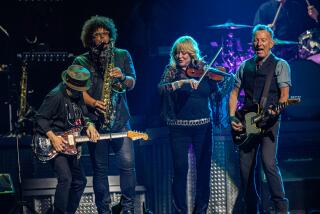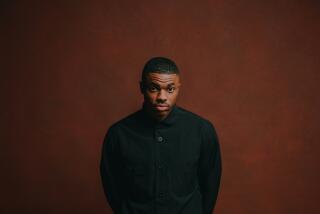‘ELVIS’: THE WAY BINDER WANTS TO REMEMBER HIM
- Share via
Elvis Presley was rock’s greatest star.
He didn’t invent rock ‘n’ roll, but he largely defined both the music and attitude in the ‘50s.
Elvis sold more records than anyone in the history of pop (an estimated 1 billion ) and he has been cited as the main inspiration by almost anyone you’re likely to nominate as a challenger for the greatest rocker title. That includes challengers ranging from John Lennon and Paul McCartney to Bruce Springsteen.
Because Elvis would have been 50 next Tuesday, we’re sure to be hearing and reading a lot about him this month.
Two of the most ambitious offerings will be on cable television. “Elvis: One Night With You” debuts at 8 p.m. Saturday on HBO, while “Elvis Presley’s Graceland” premieres on Showtime at 9 p.m. next Tuesday.
Both shows were directed by Steve Binder, a veteran television producer-director who helped orchestrate one of the most dramatic moments in Elvis’ career: Presley’s 1968 NBC-TV special.
“Elvis: One Night With You” consists of largely unseen concert footage taped in connection with the ’68 show and it’s a must for Presley fans.
Presley’s talent wilted in the early and mid-’60s through a series of increasingly hapless movies and equally bland records. The ’68 special, which Binder directed, re-introduced the rawer, more vital Presley to American audiences.
The highlight of that show was a brief excerpt of Presley going through some of his old hits and other favorites in an informal concert session with Scotty Moore and D.J. Fontana, his guitarist and drummer from the ‘50s.
In “Elvis: One Night With You,” we get to see the entire 60-minute concert session--and it’s a gem. Among the songs: “One Night,” “Heartbreak Hotel,” “Blue Suede Shoes,” “Baby, What You Want Me to Do” and “Blue Christmas.”
Binder’s Showtime production is less noteworthy: a tour of Graceland, the Presley mansion in Memphis, hosted by Elvis’ ex-wife, Priscilla Beaulieu Presley. The show was loosely patterned, Binder acknowledges, after the Jacqueline Kennedy’s Emmy-winning tour of the White House in 1962.
Presley fans will enjoy the glimpses of rooms previously off-limits to the public, but the special has a flat, unconvincing tone that is bogged down with several key people in Elvis’ life recycling old anecdotes. Because of contractual problems with RCA Records, there isn’t even any Elvis music in the show.
Perhaps the difference between the two specials can be summarized this way: “Elvis Presley’s Graceland” is only about Elvis. “Elvis: One Night With You” is Elvis.
Binder was a hot young TV producer-director in 1968 when asked by NBC to get involved with the Presley special. The network had already signed a contract with Presley’s manager, Col. Tom Parker, to do the show, but things were moving slowly. Binder, whose open, energetic demeanor still invites the use of word youthful, suspects the NBC executives felt he could better relate to Elvis, who was 33 at the time.
In his West Hollywood office, Binder recalled the initial meeting with Presley.
“Elvis, Col. Parker and the entourage came over to the office one afternoon and the only condition I made is that I could talk to Elvis alone,” Binder recalled. “The thing that impressed me about Elvis was that there was no star ego, no false front.
“I sensed that he was real nervous about doing this. He hadn’t been in front of the people for 10 years (except in movies) and he wasn’t sure whether they would accept him again.”
To Binder, the challenge was to show the raw Elvis, not the homogenized figure that Elvis had become in the movies.
“The original arrangement between the Colonel and NBC was for ‘a quick, hello-goodby format: no talk and a lot of Christmas songs,’ ” Binder related.
“I told Elvis that concept would never make it as far as I was concerned. I thought the reason his career had sort of ground down to a stop was that nobody knew the rock ‘n’ roll Elvis anymore . . . He had been reduced to singing the songs that guys who wrote lousy movie scripts were writing for him. I sensed that frustration in Elvis.”
Binder got Elvis’ approval to put together a show with a much wider and more hard-edge scope than originally envisioned. Still, the key segment--the one shown in the HBO special--was largely an afterthought.
After each day’s shooting or rehearsal on the NBC lot in Burbank, Presley would get together with cronies and unwind by singing old country, blues or gospel tunes, sometimes for five or six hours.
“I thought that was great--a relaxed Elvis that we had never been able to see,” Binder said. “I wanted to tape it, not knowing at the time what exactly to do with it. I wasn’t allowed to actually bring the cameras in the dressing room, but the Colonel did say we could re-create the session on stage if Elvis retained total approval. If Elvis didn’t like the footage, it would be erased.”
Two 60-minute sessions were arranged, one for 6 p.m and one for 8 p.m.
But they almost didn’t come off.
Recalled Binder, “Elvis called me in the dressing room two minutes before we were scheduled to begin and said, ‘Steve I think you made a mistake. My mind’s a blank, I don’t know what to sing or what to say.’ ”
Binder, however, convinced Elvis to proceed.
“I think the magic of the 6 o’clock show (which is the one used in the HBO special) is that it wasn’t a real secure Elvis Presley who walked on stage,” the director continued. “He was real nervous. He started out musically real shaky and you could sort of see the adrenalin start flowing . . . the talent come oozing out . . . the confidence building.”
Almost two decades later, the segment remains compelling. Dressed in black leather to echo the ‘50s rebel tradition, Elvis seemed stiff at first. But he eventually exhibited an energy and intensity that let you apply the words electric and vibrant to him for the first time in nearly a decade. It was the key moment in a comeback that would be climaxed by his triumphant early appearances in Las Vegas.
Though Presley’s chief impact on rock was tied to the ‘50s, he was arguably a stronger singer and more commanding showman in the early days of his comeback--before all the personal problems led to his horrifying decline and death.
Binder had just finished Diana Ross’ ambitious live Central Park cable special last year when contacted by the Presley estate about designing a show to salute the 50th anniversary of Elvis’ death.
His first plan was what he describes as his “concert fantasy”: a concert on the grounds of Graceland featuring rock greats like Paul McCartney, Mick Jagger and Bruce Springsteen. But it soon became apparent that Binder wasn’t going to be able to line up those artists. Rather than step down to the next level of pop stars, Binder came up with the idea of showing the ’68 out-takes.
After that plan was accepted, the Presley estate asked Binder about a second program. “My idea was to do something very personal, very simple,” he said. “I knew Priscilla was just getting involved with ‘Dallas’ and wondered if she would be willing to participate in the show.
Binder went to Graceland and researched the house and some of Presley’s story. He also sent Priscilla a tape of the Jacqueline Kennedy White House special. She agreed to host the show and suggested that the program be expanded to include brief appearances by such key figures in Elvis’ past as record producer Sam Phillips and top aide Joe Esposito.
“Going to Graceland for me was like investigative reporting because I was putting together this incredible puzzle of who Elvis Presley was,” Binder said. “I’m real happy I did it because it was like going through a museum--behind doors that nobody ever gets to go. I also got to meet with some of the people who knew Elvis and compare their impressions with the ones I had.
“There was one time we got stuck in traffic going by the Hollywood Bowl and he had the time of his life just rolling down the window, making jokes and flirting with the girls in the other cars as we went down Highland Avenue. That’s the way I like to remember him.
“That’s the way people in Memphis try to remember him too. The amazing thing about Graceland is the way the fans treat it. . . . There’s never been one item at Graceland stolen. None of the walls are chipped. I think a lot of that has to do with the fact that everybody remembers the humanism of Elvis Presley and there was more to him than just giving away Cadillacs.”
More to Read
The complete guide to home viewing
Get Screen Gab for everything about the TV shows and streaming movies everyone’s talking about.
You may occasionally receive promotional content from the Los Angeles Times.






